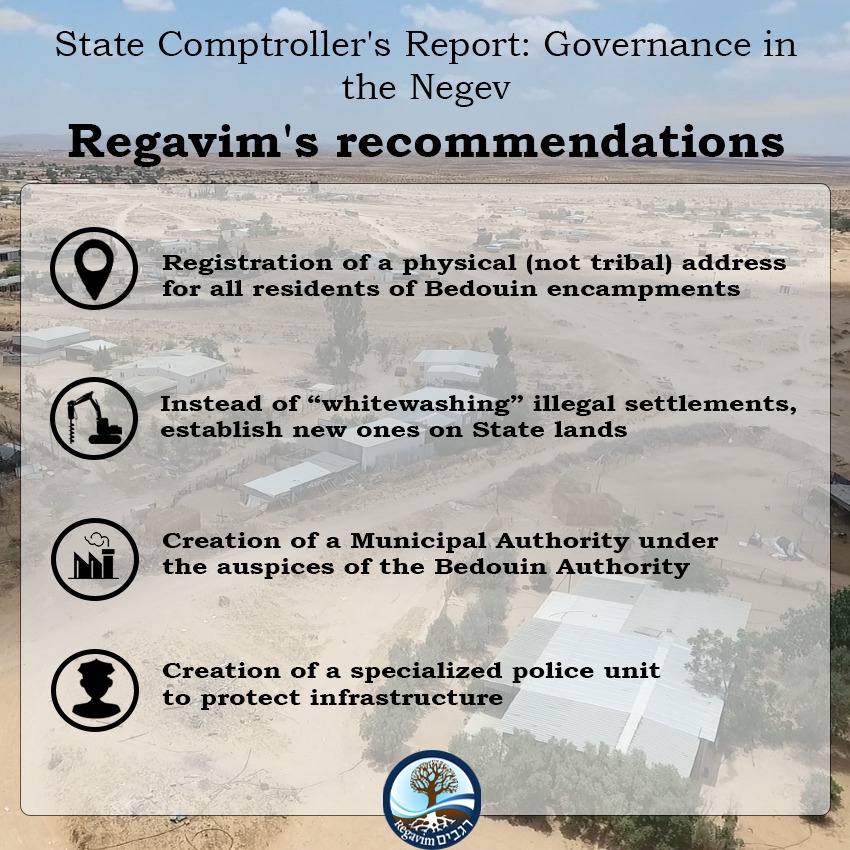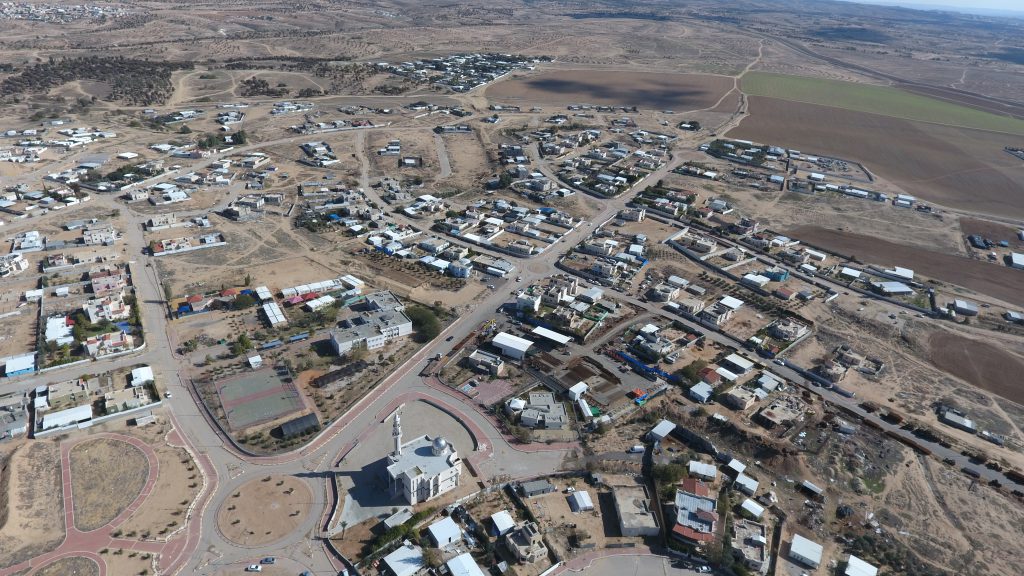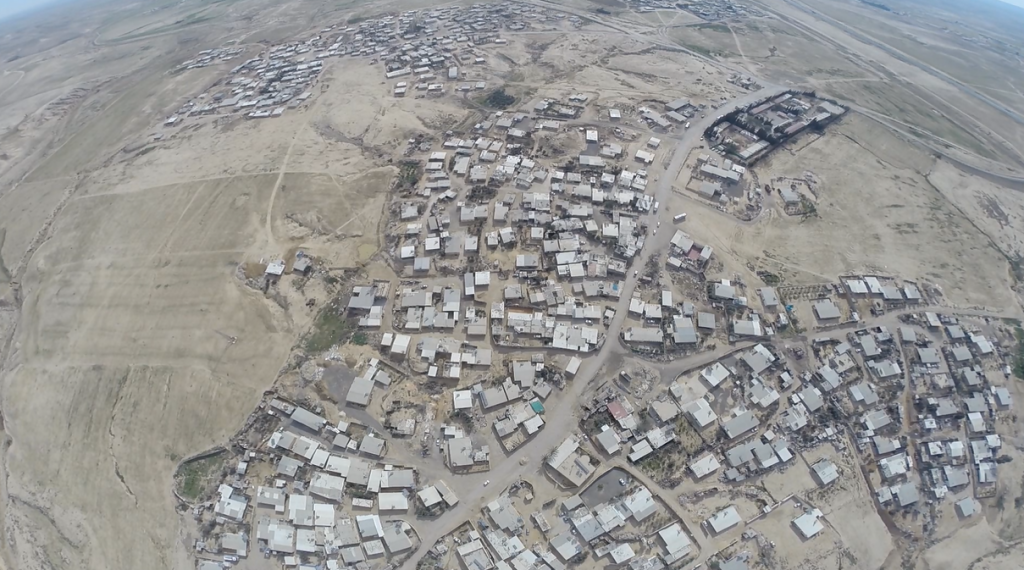
The Regavim Movement reacted to the findings of the State Comptroller, released today (Wednesday) in a report focusing on governance in the Negev: “The government can turn the situation in the Negev around – by enacting five practical recommendations that arise from this in-depth and comprehensive report.”
Meir Deutsch, Director General of Regavim: “This is a comprehensive and thorough report that touches upon the core problems at the heart of the dire situation in the Negev, the critical issues that impact the future of the region. Many of the issues raised by the State Comptroller have been at the top of Regavim’s agenda for years, and the report’s findings bear out all of our claims: ‘Whitewashing’ or ‘legalizing’ illegal construction in the absence of prior planning perpetuates and exacerbates the loss of state land in the Negev. The State Comptroller’s report must not be allowed to languish on a shelf and collect dust; the government must distill operational decisions from this important study and take action without delay.”
Regavim has recommended five practical steps that the government must extrapolate from the report’s findings.
1. Geographic registration: Presently, the majority of the residents of illegal Bedouin squatters’ camps in the Negev live “off the grid;” they have no registered address. Some 80,000 Israeli Bedouin citizens of the Negev hold identity cards that record only their tribal affiliation – even when the tribe to which they belong is spread across dozens of square kilometers. This is one of the central causes of the loss of governance in the Negev. It results in mass-scale tax evasion and other major losses to the state’s economy, false and duplicate reporting for benefits and services, and more.
The solution: Registration of a physical address for all residents of the Bedouin encampments based on a precise location that can be visited and confirmed by an inspector, based on 12-digit GPS coordinates. The moment a geographical place of residence is confirmed, all service provision and interaction with the government and its various authorities will be based on this address, until such time as these residents relocate to recognized, legal communities where there are standard street addresses.
2. Failure of the “legalization” method – The State Comptroller’s findings support what Regavim has been explaining for years: The rural communities of the Neveh Midbar and Al Kasum Regional Councils are nothing more than a fiction, and both the state and the residents are paying a very high price to support this fiction.
These communities were created by simply drawing “blue lines” (jurisdictional boundaries) around clusters of illegal structures, redefining them as legal communities and creating a jurisdictional umbrella, without any prior urban planning or infrastructure, in an attempt to take retroactive action against the facts on the ground created by rampant illegal construction. This ‘legalization’ method has been an abject failure, as these local authorities and the Bedouin Regulation Authority are forced to deal with the near-impossibility of providing infrastructure for unplanned “communities” – including paved roads, electricity, water and sewage infrastructure.
The non-solution: This “legalization” method entrenches and exacerbates the problems of illegal construction, massive loss of state land and inadequate solutions for the Bedouin citizens living in these communities. Yet the extortionist demands by the Raam Party in the current government coalition seek to continue this destructive practice, through the “recognition” of new settlements and expansion of “communities” in these municipalities to include additional squatters’ camps and “whitewash” them. The State Comptroller’s report leaves no room for doubt: This will make an already bad situation even worse, and will replicate the failed model of Neveh Midbar and Al Kasum.
3. Removing obstacles to development and construction processes: The “rural Bedouin communities” (with the exception of Tarabin and Bir Hadaj) were built on land for which there are outstanding ownership claims – land on which no Bedouin is willing to build or settle, and which cannot be utilized for the creation of infrastructure or other public installations. The state and local authorities’ responses to the long list of lawsuits and petitions filed by Regavim, is now joined by the State Comptroller’s report; all are in agreement that the main obstacle to development of infrastructure as well as to the building permit process is, first and foremost, the fact that towns were built on land covered by ownership claims.
The solution: The government must stop expanding municipal “blue lines” and abandon the practice of creating new communities based on pre-existing illegal squatters’ camps. The only logical path forward is to create new communities exclusively on state land, in strict adherence to all relevant professional standards for planning and infrastructure development.

4. Creation of a Municipal Authority under the auspices of the Bedouin Authority – The fact that Bedouin municipalities provide services to the squatters’ camps that lie beyond their own jurisdictional borders, places even greater stress on local governments that are already among the nation’s weakest. Aside from the more basic question of the legality of this “arrangement” – in which municipalities are active beyond their jurisdictional lines – it invites large-scale corruption and waste.
The solution: Creation of a separate authority responsible for providing municipal services to the squatters’ camps, under the jurisdiction of the Bedouin Regulation Authority, will relieve the existing local authorities of the burden they are currently shouldering. As in all other areas of the country, the Bedouin municipalities of the Negev will maintain responsibility for provision of services only for the citizens living within their jurisdiction. This will clarify where each resident of the unrecognized settlements is to receive services, and significantly reduce double-reporting, corruption and waste. The new Municipal Authority will be a less localized body, making it much stronger and less easily manipulated than local authorities, and subject to far fewer local pressures.

5. Creation of a specialized police unit to protect infrastructure – One of the harshest findings of the State Comptroller’s report is the unfathomable destruction of national water, electricity and energy infrastructure throughout the Negev, and the staggering costs for the national economy and the Israeli taxpayer. The report indicates that national utility corporations contend with hundreds of incidents of sabotage and theft in the Negev each year: Break-ins at electricity substations, theft and damage to generators, transformers and electric lines, water siphoning resulting in tens of millions of Shekels of losses each year, and hundreds of cases of “improvised” illegal electricity hookups. Apart from the direct damages amounting to hundreds of millions of Shekels in stolen water and electricity, and the loss of tax income had these commodities been consumed by law-abiding customers, the utility companies are forced to invest heavily in security.
The solution: Establish a specialized police unit tasked exclusively with protection of infrastructure. This unit will reduce the damage to physical infrastructure components and the economic damage caused to the national economy, and cut off the massive “protection” network that has sprung up around national infrastructure installations in the Negev. The government’s investment in this specialized unit will cover itself very quickly.
Related Posts
Building a vision for the Negev
Big news for the State of Israel: The government has outlined a historic and strategic plan that will restore governance and personal safety to the Negev. Last week, Prime Minister Netanyahu convened a meeting of the Ministerial Committee on Legalizing the Settlement, and the Economic Development, of the Bedouin Sector in the Negev to discuss […]
Petition: Tomorrow’s “Day of Disruption” isn’t a protest, it’s sanctioned anarchy
The Regavim Movement submitted a petition to the High Court this morning (Wednesday) demanding that the Police Commissioner and the Attorney General be required to stop the ‘Day of Disruption’ protest planned this week and investigate its leaders for sedition and incitement to commit crimes. After a number of urgent appeals to the Police Commissioner […]








